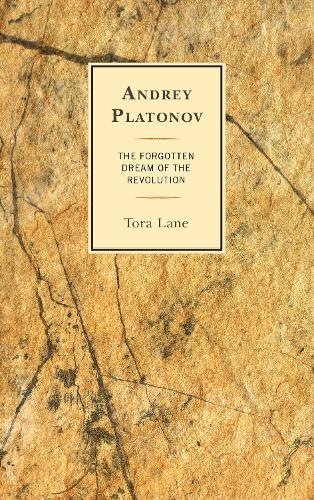
Andrey Platonov: The Forgotten Dream of the Revolution
(Paperback)
Available Formats
Publishing Details
Andrey Platonov: The Forgotten Dream of the Revolution
By (Author) Tora Lane
Bloomsbury Publishing PLC
Lexington Books
6th July 2020
United States
Classifications
Professional and Scholarly
Non Fiction
891.7342
Physical Properties
Paperback
160
Width 154mm, Height 220mm, Spine 12mm
249g
Description
This book traces the originality of Andrey Platonovs vision of the Revolution in readings of his works. It has been common in Platonov scholarship to measure him within the parameters of a political pro et contra the October Revolution and Soviet society, but the proposal of this book is to look for the way in which the writer continuously asked into the disastrous aspects of the implementation of a new proletarian community for what they could tell us about the promise of the Revolution to open up the experience of the world as common. In readings of selected works by Andrei Platonov I follow the development of his chronicle of revolutionary society, and from within it the outline of the forgotten utopian dream of a common world. I bring Platonov into a dialogue with certain questions that arise from the philosophy of Martin Heidegger and that were later re-addressed in the works of Maurice Blanchot, Georges Bataille and Jean-Luc Nancy, related to the experience of the modern world in terms of communality, groundlessness, memory, interiority. I show that Platonov writes the Revolution as an implementation of common being in society that needs to retrieve the forgotten memory of what being in common means.
Reviews
Lane (Sdertrn Univ., Sweden) should be commended for taking on a subject as complex as Andrey Platonov (18991951), whose ideas, language, and views of historywhether taken individually or togetherhave challenged readers for decades. Lane examines Platonov's works to see how he reconciles the disastrous effects of the Russian Revolution with its Utopian promise. . . Accordingly, this welcome exegesis of Platonov's works will appeal to those well-acquainted with Platonov and philosophers such as Heidegger, Blanchot, and Bataille and to less-sophisticated students of Russian literature. Her translations are good as are her notes, which appear at the end of each chapter. The ample list of references will lead anyone interested in Platonov to fertile ground for further study. Lane's study will be invaluable to Russianists, historians of the Russian Revolution, and anyone interested in Utopian ideals and their hidden capacity for tyranny. Summing Up: Recommended. Ambitious upper-division undergraduates, graduate students, researchers, and faculty. * CHOICE *
Lanes broader commitment to seeing Platonov through a distinct philosophical prism is productive and perceptive, and may well serve to stimulate further debate. * Slavic Review *
Lanes idea that what makes Platonov distinctive is his search for revolutionary consciousness in literature as suchas a mode of ironic distance, alienation, or a frustrated alternative to life itselfis interesting and generally consonant with the view prevalent in other scholarship on Platonov. The readings she offers are also eloquently sensitive to Platonovs existential themes. . . . Lanes reading of Platonov on the broader plane of twentieth-century thought is welcomeand deserves to be expanded upon. * The Russian Review *
Tora Lane does much to bring out the complexity, the subtlety and the hopefulness of Platonovs work, helping the reader to understand why so many Russian writers and critics see Platonov as the greatest Russian prose-writer of the last century. -- Robert Chandler, English translator of Andrey Platonovs "The Foundation Pit" and "Soul and Other Stories" and Vasily Grossman's "Life and Fate and Stalingrad"
Andrey Platonov is arguably one of the greatest, aesthetically most original and politically most interesting writers of twentieth century world literature. By stereoscopically examining Platonovs aesthetics as well as the Soviet idea of communism, Tora Lane reveals with brilliance, precision and erudition the originality of Platonovs style and social vision. This is an important book not just for its analysis of Platonov but also for its deep insights into the Russian Revolution and the existential and political energies released by early Soviet communism. -- Stefan Jonsson, Linkping University, author of Crowds and Democracy
Author Bio
Tora Lane is as researcher at Sdertrn University.
